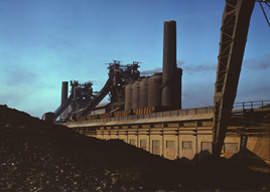
January 16, 2012

Carnegie Steel
“They’re vultures that are sitting out there on the tree limb, waiting for a company to get sick, and then they swoop in … eat the carcass … and … leave the skeleton.”
So Rick Perry colorfully characterized the private equity firm Bain Capital, once run by Mitt Romney.
How did Bain prosper? Says Perry:
“These companies … come in and loot the people’s jobs, loot their pensions (and) loot their ability to take care of their families.”
Behind this depiction is a 28-minute documentary, “King of Bain,” being aired in South Carolina by a super political action committee that supports Newt Gingrich and is financed by Vegas-Macau casino billionaire Sheldon Adelson.
The truth, however, turns out to be less colorful, as The Washington Post has awarded the documentary four Pinocchios for “manipulative interviews” and a “highly misleading portrayal of Romney’s years at Bain Capital.”
Seems that two of the companies Bain allegedly looted were not acquired until after Mitt left the firm, and the closure of a third plant in Gaffney, S.C., was no communal disaster.
No one in Gaffney, writes The New York Times, seems to recall the company, and the local paper did not even report its demise.
“King of Bain” is a hit piece, a malicious libel full of so many errors and lies that even Newt said it must be corrected or pulled down.
Yet if Romney is nominated, we will see this avenue of attack pursued by the Democrats. For populist assaults on capitalists and capitalism, dating back to William Jennings Bryan’s “Cross of Gold” speech to the 1896 Democratic National Convention, have a long and venerable history.
Moreover, the hysteria of Beltway Republicans and their Chamber of Commerce allies over the Newt-Perry attacks on Mitt “the predator” and Mitt “the vulture capitalist” testifies to the power of the narrative and Republicans’ fear of it. And they would do well to be fearful.
To many Americans, the period from the Civil War to World War I, when U.S. production grew from half of what Britain produced to twice what Britain produced, was a legendary era of growth and prosperity.
To others, however, this was the Gilded Age of Jim Fisk and James Gould, of robber barons and the Pullman strike, of the Haymarket Massacre and the Homestead strike at Carnegie Steel, where armed Pinkertons came up the river in barges to break the strike, only to be shot, disarmed and beaten by strikers and their families.
In 1904, Ida Tarbell wrote “The History of the Standard Oil Company,” painting oil magnate John D. Rockefeller as a capitalist without conscience, a “money-mad … hypocrite.” “Our national life is on every side distinctly poorer, uglier, meaner, for the kind of influence he exercises.”